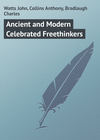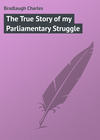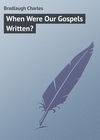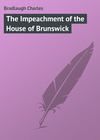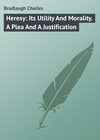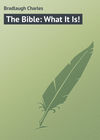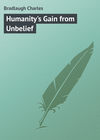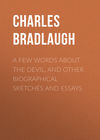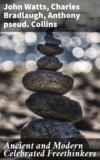Buch lesen: «Ancient and Modern Celebrated Freethinkers», Seite 16
"I."
MATTHEW TINDAL
It is easy to mark the progress of the age by recurring to the history of past Freethinkers. Bishops, established and dissenting, are now repeating the parts the old Deiste played. They were sadly treated for setting the example, modern divines follow with applause.
Matthew Tindal was an example of this. He labored to establish religion on the foundation of Reason and Nature. It was to be expected that Christians would be pleased at efforts which would have no effect but to strengthen its foundations. The effort was met by reprobation, and resented as an injury. It is but a just retaliation that believers should now have to establish in vain that evidence they once denounced.
Matthew Tindal was an English Deistical writer, who was born at Beer-Terres, in Devonshire, 1656. – His father, it appears, was a clergyman, who held the living of Beer-Terres, presented to him by the University of Cambridge, in the time of the Civil Wars. – Young Matthew was educated at Oxford, where at twenty-eight he took the degree of LL.D. Matthew Tindal, LL. D., was early tossed about by the winds of doctrine. First he embraced Romanism: afterwards he became a Protestant. Then politics interested him, and he engaged in controversy on the side of William III. He was appointed Commissioner of a Court for Trying Foreigners. In 1693 he published an essay on the Law of Nations When fifty-four, in 1710, he entered so vigorously into theological controversy, arising out of Trinitarian criticism, that his marked satire led to his books being condemned by the House of Commons, and burnt by the hangman. He resented this indignity by a spirited attack on the dominant priestly party in his "High Church Catechism," and he also wrote in defence of philosophical necessity. But his most notable work was the performance of his old age, his "Christianity as Old as the Creation: or, the Gospel, a Republication of the Religion of Nature." This was produced in his seventy-third year. He was attacked in Reply by Bishop Waterland. It is generally agreed that in point of good spirit and good temper the Bishop was far inferior to the Deist. Dr. Conyers Middleton, says Thomas Cooper, in his brief sketch of Tindal, appeared in defence of Tindal in a "Letter to Dr. Waterland," whom he condemned for the shallowness of his answer to Tindal, and boldly and frankly admitted that the Freethinker was right in asserting that the Jews borrowed some of their ceremonies and customs from Egypt; that allegory was, in some cases, employed in the Scriptures, where common readers took the relation for fact; and, that the Scriptures are not of "absolute and universal inspiration." The following sentence, which will be found in this "Letter" of Dr. Conyers Middleton, does honor to his name: – "If religion consists in depreciating moral duties and depressing natural reason; if the duty of it be to hate and persecute for a different way of thinking where the best and wisest have never agreed – then. I declare myself an Infidel, and to have no share in that religion." Matthew Tindal died at his house in Coldbath Fields, of the stone, 1773, aged seventy-seven. * Rysbrach, the famous statuary, took a model of him.
* Julian Hibbert gives 1656-7: Dr. Beard, 1556; Thomas
Cooper, 1657, as the year of Tindal's birth. All agree that
he died 1733 – he was therefore seventy-six or seventy-seven
at the time of his death.
Tindal opens his great work thus: – "The author makes no apology for writing on a subject of the last importance; and which, as far as I can find, has no where been so fully treated: he builds nothing on a thing so uncertain as tradition, which differs in most countries; and of which, in all countries, the bulk of mankind are incapable of judging; but thinks he has laid down such plain and evident rules, as may enable men of the meanest capacity, to distinguish between religion and superstition; and has represented the former in every part so beautiful, so amiable, and so strongly affecting, that they, who in the least reflect, must be highly in love with it; and easily perceive, that their duty and happiness are inseparable."
The character of the performance will be seen from a few of the propositions he maintains: —
"That God, at all times, has given mankind sufficient means of knowing whatever he requires of them.
"That the religion of nature consists in observing those things, which our reason, by considering the nature of God and man, and the relation we stand in to him, and one another, demonstrates to be our duty; and that those things are plain; and likewise what they are.
"That the perfection and happiness of all rational beings, supreme as well as subordinate, consist in living up to the dictates of their nature.
"That God requires nothing for his own sake; no, not the worship we are to render him, nor the faith we are to have in him.
"That the not adhering to those notions reason dictates, concerning the nature of God, has been the occasion of all superstition, and those innumerable mischiefs, that mankind, on the account of religion, have done either to themselves, or one another.
"The bulk of mankind, by their reason, must be able to distinguish between religion and superstition; otherwise they can never extricate themselves from that superstition they chance to be educated in."
Tindal deals with the question of the obscurity of Revelation in these terms, sufficiently salient to alarm the very proper divines of that day: —
"Had God, from time to time, spoken to all mankind in their several languages, and his words had miraculously conveyed the same ideas to all persons; yet he could not speak more plainly than he has done by the things themselves, and the relation which reason shows there is between them. Nay, since it is impossible in any book, or books, that a particular rule could be given for every case, we must even then have had recourse to the light of nature to teach us our duty in most cases; especially considering the numberless circumstances which attend us, and which, perpetually varying, may make the same actions, according as men are differently affected by them, either good or bad. And I may add, that most of the particular rules laid down in the gospel for our direction, are spoken after such figurative a manner, that except we judge of their meaning, not merely by the letter, but by what the law of nature antecedently declares to be our duty, they are apt to lead us wrong. And if precepts relating to morality are delivered after an obscure manner, when they might have been delivered otherwise; what reason can you assign, for its being so, but that infinite wisdom meant to refer us to that law for the explaining them? Sufficient instances of this nature I shall give you hereafter, though I must own, I cannot carry this point so far as a learned divine, who represents the Scriptures more obscure (which one would think impossible) than even the fathers. He tells us, 'that a certain author (viz., Flaccus Illyricus) has furnished us with one-and-fifty reasons for the obscurity of the Scriptures;' adding, 'I think I may truly say that the writing of the prophets and apostles abound with tropes, and metaphors, types, and allegories, parables, and dark speeches; and are as much, nay, much more unintelligible in many places, than the writings of the ancients.' It is well this author, who talks of people being stark Bible-mad, stopped here; and did not with a celebrated wit * cry, 'The truly illuminated books are the darkest of all.' The writer above mentioned supposes it impossible, that God's will should be fully revealed by books; 'except,' says he, 'it might be said perhaps without a figure, that even the world itself could not contain the books which should be written.' But with submission to this reverend person, I cannot help thinking, but that (such is the divine goodness) God's will is so clearly and fully manifested in the Book of Nature, that he who runs may read it."
* Dean Swift – "Tale of a Tub."
In the next extract we make, we find Tindal quoting two striking passages from Lord Shaftesbury, followed by an acute vindication of the integrity of the Law of Nature over the Scriptures: —
"Had the heathen distinguished themselves by creeds made out of spite to one another, and mutually persecuted each other about the worship of their gods, they would soon have made the number of their votaries as few as the gods they worshipped; but we don't find (except in Egypt, that mother-land of superstition) that they ever quarrelled about their gods; though their gods sometimes quarrelled, and fought about their votaries. By the universal liberty that was allowed by the ancients, 'Matters (as a noble author observes) were so balanced, that reason had fair play; learning and science flourished; wonderful was the harmony and temper which arose from these contrarieties. Thus superstition and enthusiasm were mildly treated; and being let alone, they never raged to that degree as to occasion bloodshed, wars, persecutions, and devastations; but a new sort of policy has made us leap the bounds of natural humanity, and out of a supernatural charity, has taught us the way of plaguing one another most devoutly. It has raised an antipathy, that no temporal interest could ever do, and entailed on us a mutual hatred to all eternity. And savage zeal, with meek and pious semblance, works dreadful massacre; and for heaven's sake (horrid pretence) makes desolate the earth.' And further, Shaftesbury observes, 'The Jupiter of Strangers, was, among the ancients, one of the solemn characters of divinity, the peculiar attribute of the supreme deity; benign to mankind, and recommending universal love, mutual kindness, and benignity between the remotest and most unlike of the human race. Such was the ancient heathen charity and pious duty towards the whole of mankind; both those of different nations and different worship. But, good God! how different a character do bigots give us of the Deity, making him an unjust, cruel, and inconsistent Being; requiring all men to judge for themselves, and act according to their consciences; and yet authorizing some among them to judge for others, and to punish them for not acting according to the consciences of those judges, though ever so much against their own. These bigots thought they were authorized to punish all those that differ with them in their religious worship, as God's enemies; but had they considered that God alone could discern men's hearts, and alone discover whether any, by conscientiously offering him a wrong worship, could become his enemies; and that infinite wisdom best knew how to proportion the punishment to the fault, as well as infinite power how to inflict it; they would, surely, have left it to God to judge for himself, in a cause which immediately related to himself; and where they were not so much as parties concerned, and as likely to be mistaken as those they would punish. Can one, without horror, think of men's breaking through all the rules of doing as they would be done unto, in order to set themselves up for standards of truth for God as well as man? Do not these impious wretches suppose, that God is not able to judge for himself; at least, not able to execute his own judgment? And that, therefore, he has recourse, forsooth, to their superior knowledge or power; and they are to revenge his injuries, root out his enemies, and restore his lost honor, though with the destruction of the better part of mankind? But, to do the propagators of these blasphemous notions justice, they do not throw this load of scandal on the law of Nature, or so much as pretend from thence to authorize their execrable principles; but endeavor to support them by traditional religion; especially by mis-interpreted texts from the Old Testament; and thereby make, not only natural and revealed religion, but the Old and New Testament (the latter of which requires doing good both to Jews and Gentiles) contradict each other. But to return; if what the light of Nature teaches us concerning the divine perfections, when duly attended to, is not only sufficient to hinder us from falling into superstition of any kind whatever; but, as I have already shown, demonstrates what God, from his infinite wisdom and goodness, can, or cannot command; how is it possible that the law of Nature and grace can differ? How can it be conceived, that God's laws, whether internally, or externally revealed, are not at all times the same, when the author of them is, and has been immutably the same forever?'"
The following passage exhibits the judicious mixture of authority and argument for which our author is remarkable. The quotation is a good illustration of Tindal's best manner. He is replying to Dr. Samuel Clark: —
"It cannot be imputed to any defect in the light of nature, that the pagan world ran into idolatry, but to their being entirely governed by priests, who pretended communication with their gods, and to have thence their revelations, which they imposed on the credulous as divine oracles: whereas the business of the Christian dispensation was to destroy all those traditional revelations; and restore, free from all idolatry, the true primitive, and natural religion, implanted in mankind from the creation. The Dr. (Clark) however, seems afraid, lest he had allowed too much to the light of nature, in relation to the discovery of our duty both to God and man; and not left room for revelation to make any addition; he therefore supposes, 'there are some duties, which nature hints at only in general.' – But, if we cannot, without highly reflecting on the wisdom and goodness of God, suppose that he has not, at all times, given the whole rational creation a plain rule for their conduct, in relation to those duties they owe to God, themselves, and one another; must we not suppose reason, and religion (that rule of all other rules) inseparable; so that no rational creature can be ignorant of it, who attends to the dictates of his own mind; I mean, as far as it is necessary for him to know it! An ignorant peasant may know what is sufficient for him, without knowing as much as the learned rector of St. James's. Though the Dr. says, 'the knowledge of the law of nature is, in fact, by no means universal;' yet he asserts, that 'man is plainly in his own nature an accountable creature;' which supposes that the light of nature plainly, and undeniably, teaches him that law, for breach of which he is naturally accountable; and did not the Dr. believe this law to be universal, he could not infer a future judgment from the conscience all men have of their actions, or the judgment they pass on them in their own minds whereby 'They that have not any law, are a law unto themselves; their consciences bearing witness, and their thoughts accusing, or excusing one another;' which is supposing but one law, whether that law be written on paper, or in men's hearts only; and that all men by the judgment they pass on their own actions, are conscious of this law. And, the apostle Paul, though quoted by the Dr., is so far from favoring his hypothesis of any invincible ignorance, even in the wisest and best of the philosophers, that he, by saying, The Gentiles, that have not the law, do by nature the things contained in the law, makes the law of nature and grace to be the same: and supposes the reason why they were to be punished, was their sinning against light and knowledge. That which may be known of God was manifest in them, and when they knew God, they glorified him not as God. And they were likewise guilty of abominable corruptions, not ignorantly, but knowing the judgment of God, that they who do such things are worthy of death.
"Had the Dr. but considered this self-evident proposition, that there can be no transgression where there is no law; and that an unknown law is the same as no law; and consequently, that all mankind, at all times, must be capable of knowing all (whether more or less) that God requires, it would have prevented his endeavoring to prove, that, till the gospel dispensation, mankind were entirely, and unavoidably ignorant of their duty in several important points; and thus charging the light of nature with undeniable defects. I think it no compliment to external revelation, though the Dr. designed it as the highest, to say, it prevailed, when the light of nature was, as he supposes, in a manner extinct; since then an irrational religion might as easily obtain, as a rational one. The Dr., to prove that revelation has supplied the insufficiency, and undeniable defects of the light of nature, refers us to Phil., iv., 1, which he introduces after this pompous manner: – 'Let any man of an honest and sincere mind consider, whether that practical doctrine has not, even in itself, the greatest marks of a divine original, wherein whatsoever things are true, whatsoever things are honest, whatsoever things are just, whatsoever things are pure, whatsoever things are lovely, whatsoever things are of good report, if there be any virtue, it there be anything praiseworthy; all these, and these only, are earnestly recommended to man's practice.' I would ask the Dr., how he can know what these are, which are thus alone earnestly recommended to man's practice; or, why they have, in themselves, the greatest marks of a divine original; but from the light of nature? Nay, how can the Dr. know there are defects in the light of nature, but from that light itself? which supposes this light is all we have to trust to; and consequently, all the Dr. has been doing, on pretence of promoting the honor of revelation, is introducing universal scepticism. And I am concerned, and grieved, to see a man, who had so great a share of the light of nature, employing it to expose that light, of which before he had given the highest commendation; and which can have no other effect, than to weaken even his own demonstration, drawn from that light, for the being of a God. I shall mention but one text more, which, had not the Dr. thought it highly to his purpose, for showing the insufficiency of the light of nature, he would not have ushered it in after this most solemn manner: – 'When men have put themselves into this temper and frame of mind, let them try if they can any longer reject the evidence of the gospel. If any man will do his will, he shall know of the doctrine; whether it be of God.' Is it not strange, to see so judicious a divine write after such a manner, as if he thought the best way to support the dignity of revelation, was to derogate from the immutable and eternal law of nature? and while he is depressing it, extol revelation for those very things it borrows from that law? in which, though he asserts there are undeniable defects, yet he owns that God governs all his own actions by it, and expects that all men should so govern theirs.
"But, I find the Dr.'s own brother, the Dean of Sa-rum, is entirely of my mind, as to those texts the Dr. quotes – viz., Rom. ii., 14, and Phil, iv., 8. As to the first – viz., Rom. ii., 14, he says, 'The apostle supposes, that the moral law is founded in the nature and reason of things: that every man is endued with such powers and faculties of mind, as render him capable of seeing, and taking notice of this law; and also with such a sense and judgment of the reasonableness and fitness of conforming his actions to it, that he cannot but in his own mind acquit himself when he does so; and condemn himself when he does otherwise.' And as to the second – viz., Phil, iv., 8, where the same apostle recommends the practice of Virtue, upon the fore-mentioned principles of comeliness and reputation. – 'These principles,' says he, 'if duly attended to, were sufficient to instruct men in the whole of their duty towards themselves, and towards each other. And they would also have taught them their duty towards God, their Creator and Governor, if they had diligently pursued them. For according as the apostle expresses it, Rom. i., 20, the invisible things of God from the creation of the world are clearly seen, being understood by the things that are made, even his eternal power and Godhead. The same fitness and decency that appears in men's regular behavior towards each other, appears also in their behavior towards God. And this, likewise, is founded in the nature and reason of things; and is what the circumstances and condition they are in do absolutely require. Thus we see therein moral virtue, or good consists, and what the obligation to it is from its own native beauty and excellency.'"
One more example of Tindal's style will show how skilfully and cogently he forced, the great authorities of his day to bear Witness to the truth of his leading proposition, the natural antiquity of all the reasonable precepts of the Bible: —
"The most accurate Dr. Barrow gives this character of the Christian religion, 'That its precepts are no other than such as physicians prescribe for the health of our bodies; as politicians would allow to be needful for the peace of the state; as Epicurean philosophers recommend for the tranquillity of our minds, and pleasures of our lives; such as reason dictates, and daily shows conducive to our welfare in all respects; which consequently, were there no law enacting them, we should in wisdom choose to observe, and voluntarily impose them on ourselves; confessing them to be fit matters of law, and most advantageous and requisite to the good, general and particular, of mankind.'
"That great and good man Dr. Tillotson says, 'That all the precepts of Christianity are reasonable and wise, requiring such duties as are suitable to the light of nature, and do approve themselves to the best reason of mankind; such as have their foundation in the nature of God, and are an imitation of the divine excellencies; such as tend to the perfection of human nature, and to raise the minds of men to the highest pitch of goodness and virtue. They command nothing that is unnecessary, they omit nothing that may tend to the glory of God, or the welfare of men, nor do they restrain us in anything, but what is contrary to the regular inclinations of nature, or to our reason, and true interest; they forbid us nothing but what is base and unworthy to serve our humors and passions, to make ourselves fools and beasts. In a word, nothing but what tends to our private harm, or prejudice, or to public disorder and confusion.'
"The late Dean of Canterbury, in a sermon preached in defence of Christianity, says, * 'What can be a more powerful incentive to obedience, than for a rational creature clearly to discern the equity, the necessity, the benefit, the decency and beauty of every action he is called to do, and thence to be duly sensible how gracious a master he serves; one that is so far from loading him with fruitless, arbitrary, and tyrannical impositions, that each command abstracted from his command who issues it, is able to recommend itself; and nothing required but what every wise man would choose of his accord: and cannot, without being his own enemy, wish to be exempted from?' And this character of Christianity he makes to be essential to its being from God, and therefore must make it the same with natural religion, which has this character impressed on it.
"'There was none of the doctrines of our Saviour (says the late Archbishop of York) ** calculated for the gratification of men's idle curiosities, the busying and amusing them with airy and useless speculations; much less were they intended for an exercise of our credulity, or a trial how far we could bring our reason to submit to our faith; but as on the one hand they were plain and simple, and such as by their agreeable-ness to the rational faculties of mankind, did highly recommend themselves to our belief; so on the other hand they had an immediate relation to practice, and were the general principles and foundation, on which all human and divine virtues were naturally to be superstructed.'
* Boyle's Lect., p. 26,
** Sermon before the Queen on Christmas Day, 1724.
"Does not every one see, that if the religion of nature had been put instead of Christianity, these descriptions would have exactly agreed with it? The judicious Dr. Scot affirms, 'God never imposes laws on us pro imperio, as arbitrary tests and trials of our obedience. The great design of them (says he,) is to do us good, and direct our actions to our own interest. This, if we firmly believe, will infinitely encourage our obedience; for when I am sure God commands me nothing but what my own health, ease, and happiness requires; and that every law of his is both a necessary and sovereign prescription against the diseases of my nature, and he could not prescribe less than he has, without being defective in his care of my recovery and happiness; with what prudence and modesty can I grudge to obey him?'
"Nay, the most considerate men, even among the Papists, do not scruple to maintain there's nothing in religion but what is moral. The divines of Port Royal for instance, say, 'All the precepts, and all the mysteries that are expressed in so many different ways in the holy volumes, do all centre in this one commandment of loving God with all our heart, and in loving our neighbors as ourselves: for the Scripture (it is St. Austin who says it) forbids but one only thing, which is concupiscence, or the love of the creature; as it commands but one only thing, which is charity, and the love of God. Upon this double precept is founded the whole system of the Christian religion; and it is unto this, say they, according to the expression of Jesus Christ, that all the ancient law and the prophets have reference; and we may add also, all the mysteries, and all the precepts of the new law; for love, says St. Paul, is the fulfilling of the law.' And these divines likewise cite a remarkable passage of St. Austin on this subject, viz., 'He that knows how to love God, and to regulate his life by that love, knows all that the Scripture propounds to be known.' And might add the authority of a greater man, and a Papist too, * who says, 'Religion adds nothing to natural probity, but the consolation of doing that for love and obedience to our Heavenly Father, which reason itself requires us do in favor of virtue.'"
* Archbishop of Cambray: Lettres sur la Religion,
p. 258, a Paris.
Tindal was a solid, rather than a brilliant writer: but he perfectly knew what he was about; and the work from which we quote, was well conceived and carefully executed. His ground was skilfully chosen, his arguments were placed on an eminence where his friends could see them, and where his enemies could not assail them. Dr. Leland, in his view of Deistical writers, is quite in a rage with him, because he discredits Book Revelation, to set up Nature's Revelation. His real offence was, that he did prove that Nature was the only source of truth and reason – the criterion by which even Divine Revelation must be judged. He carried men back to the gospel of nature, by the side of which the gospel of the Jewish fishermen did not show to advantage. Tindal did put something in the place of that which he was supposed desirous of removing. How unwilling Christians of that day were to admit of improvement in religion, is shown by the number of attacks Tindal's work sustained. The Bishop of London published a "Second Pastoral Letter" against it; Dr. Thomas Burnet "confuted" it; Mr. Law "fully" answered it; Dr. Stebbing "obviated the principal objections" in it. "The same learned and judicious writer," observes Leland, a second time entered the lists, in "answer to the fourteenth chapter of a book, entitled 'Christianity as Old as the Creation.'" Mr. Balgny issued a "Second Letter to a Deist," occasioned by Tindal's work. Mr. Anthony O'Key gave a short view of the whole controversy. Dr. Foreter, Dr. John Conybeare, "particularly engaged public attention" as Dr. Tindal's antagonists. Mr. Simon Brown produced a "solid and excellent" answer; and Dr. Leland, with many blushes, tells us that he himself issued in Dublin, in 1773, two volumes, taking a wider compass than the other answers.
"Christianity as Old as the Creation" is a work which Freethinkers may yet consult with advantage, as a repertory of authorities no longer accessible to the readers of this generation. What these authorities allege will be found to have intrinsic value, to be indeed lasting testimonies in favor of Rationalism. In passing in review the noble truths, Tindal insists that it is impossible not to wonder at the policy, or rather want of policy displayed by Christians. Tindal is an author whom they might be proud of, if they were really in love with reason. Tindal's opponents have shown how instinctively the children of faith distrust the truths of Nature. After all the "refutations," and "confutations" and answers made to the great Deist, Tin-dal's work has maintained its ground, and the truths he so ably and spiritedly vindicated, have spread wider since and taken deeper root.
J. W.
